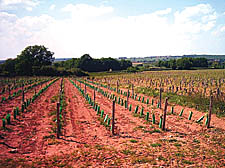|
|
 |
| |

A vineyard in central France |
Terroir in the vineyards as the control tightens
Is the system of quality control for the wine we drink too strict?
WE’VE asked before how we should, or even if we can
make sense of the deluge of consumer choice forced on us by
the free market. This isn’t confined to wine. It’s
true of anything from toothpaste or detergent to a holiday destination.
More often than not, choice means a series of bogus alternatives
between mediocre products that are barely distinguishable from
each other, except by packaging. But exercising choice carries
what economists call “heavy transaction costs”, ie:
we have to invest a lot of time and effort into research for
effective choices.
There are two stages to making a successful choice. The first
is appropriate information, preferably with some experience
behind it. This is our individual responsibility. If you throw
your money away, it’s your own problem. Secondly, however,
we need the producers and sellers of wine to provide a framework
that guarantees what is in the bottle and gives some indication
of quality.
We’re looking at France, using Andrew Jefford’s book
The New France (2002, Mitchell Beazley, £30).
This is an ambitious attempt to look at changes in French winemaking,
which have been accelerated by its exposure to global competition.
One of this book’s virtues is that Jefford doesn’t
allow his love of French wines to cloud his judgment.
The system of “appellations d’origine contrôlée”
(AOC) remains the first and most imitated regulatory regime
for wine. It is closely tied to the concept of “terroir”.
At its simplest, this means that the contents of the bottle
came from a tightly specified area.
In terroir, according to Jefford, you are experiencing “the
true scent and taste of a place”. A danger exists here
of reading too much into AOC, of giving it and terroir mystical
qualities. There is no exact English equivalent of terroir.
Our words ‘terrain’ or ‘territory’ have
no sense of the love of the land and engagement over generations
with it implied by the French term. But, returning to AOC, the
system at its best recognises that each area has its own combination
of qualities related to geology, climate and tradition that
cannot be duplicated elsewhere. Consequently, the best French
wines can literally be described as unique.
The implied contrast here is with the New World, where technology
can enhance wines or yields, but in the absence of terroir,
the price of this is uniformity. Whether this is fair to the
New World will be explored in a later column – watch this
space.
In a blind tasting of say three Chardonnays from California,
South Africa and Australia, it will be more difficult to say
which country produced each wine. This is not a problem if you
are prepared to accept a lack of variety in your choice of wines,
but it is if you welcome diversity. The AOC system, properly
applied, should not suffer from this problem.
The case against AOC is that it stifles creativity, is too complicated
for consumers, isn’t always enforced and suffers from laxly
drawn boundaries. Two main issues dominate.
Firstly, does it encourage resistance to technological advance
and innovation? Secondly, is its implementation excessively
bureaucratic? A number of innovative winemakers have opted out
of the system to give themselves more freedom in their choice
of grapes and the processes they use to make their wines, both
of which AOC controls tightly.
To an Anglo-American mentality, the idea that the government
can dictate what grapes a farmer is allowed to put into his
wines is incomprehensible. Yet most French growers happily accept
it.
This can be explained in two ways. More narrowly, since most
French wines are blends, producers work by varying the proportion
of each grape variety.
More generally, AOC wasn’t designed to measure quality
as such. But because the system operates to uphold terroir,
it has a direct and lasting effect on the quality of French
wines, mostly for the better.
It has become, in Jefford’s words, a “coded abstract”
of French wine culture, almost in defiance of the market. This
we applaud. |
|
 |
|

